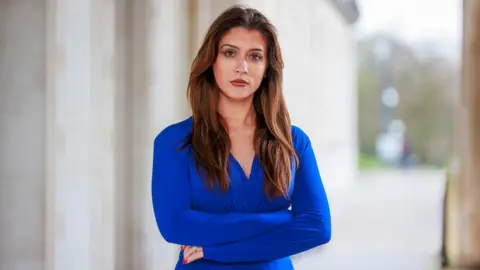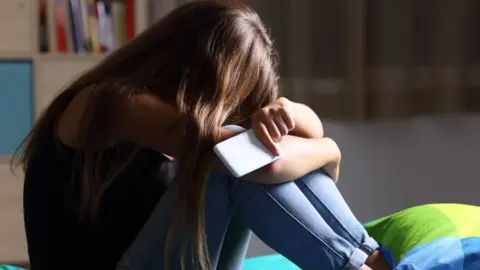Support for victims of revenge porn 'isn't good enough'
 PA Media
PA MediaSupport for victims of so-called revenge porn in Northern Ireland "isn't good enough", a Stormont assembly member has said.
The Social Democratic and Labour Party's Cara Hunter said the absence of help to target and remove intimate content shared without consent showed a "lack of urgency".
Northern Ireland is the only part of the UK and Ireland with no publicly funded service to get intimate images taken down or deleted.
The Department of Justice (DoJ) said: "As intimate image abuse becomes a growing issue, the minister is keen to enhance services."
Intimate image abuse, commonly referred to as revenge porn, is the sharing of sexual images of someone without their consent, both online and offline.
Hunter, who herself was the victim of a 'deep fake' in which a pornographic video was digitally altered to appear like her, has urged the DoJ to fund a service that proactively finds and removes non-consensual images for victims.
Similar services are government funded to operate in England, Scotland and Wales, and in the Republic of Ireland.
A victim whose intimate images were shared without consent told BBC News NI: "All I wanted was to know they'd been deleted."
Olivia (not her real name) reported the incident to police after learning that photos she had sent to a man years earlier had been shown to others in her community.
When the Public Prosecution Service (PPS) decided not to prosecute, Olivia said she felt "completely dismissed" and there was no way to ensure those images had been deleted.
"Although justice would have been great, it wouldn't help me because I don't know if those images still exist," she said.
She claimed one officer told her if she had not shared the images, then she would not be in that position.
"There was no empathy towards me, and it was as if the two men were the victims," she added.
The PPS said it had concluded "that the available evidence in this case was insufficient", and the Police Ombudsman said it was "unable to either prove or refute" Olivia's allegation that officers "had treated her insensitively".
'It's horrifying'
"This is such a cruel crime," said Hunter.
"It's a way of making people feel exposed, humiliated, ashamed, embarrassed.
"It's horrifying. I've sat in my constituency office with victims who are absolutely devastated."
The Revenge Porn Helpline is funded by the Home Office in England and Wales, and by the Scottish government in Scotland.
Its manager, Sophie Mortimer said: "Women often come to us and say 'I'm so sorry I'm having to come to you for help, I've been so stupid', and I say, 'no. You haven't done anything wrong, this is someone who has abused your trust'."
How is revenge porn removed?
 Getty
GettyThe helpline's researchers use "reverse image searches and facial recognition" to identify content on behalf of victims, Ms Mortimer said.
They then approach platforms to ask them to remove the images.
Hotline.ie helps victims in the Republic of Ireland, however no equivalent service receives funding in Northern Ireland.
Without support victims must manually search the internet using reverse image tools and scanning social media, forums, and websites themselves.
That involves filing separate reports for each image, on each platform often without assurance of swift removal or meaningful support.
While the helpline said it wouldn't turn victims in Northern Ireland away, it stressed that resources would have to be prioritised towards cases in England, Scotland and Wales where it is actually funded to help.
In a statement, the DoJ said: "Residents of Northern Ireland can avail of the support services of the Revenge Porn Helpline or visit their website.
"The department is fully engaged with the Revenge Porn Helpline to explore options available to formally extend and promote its service to Northern Ireland."
Hunter said the lack of funding for a content removal services was "part of the problem".
"A lot of revenge porn is undeniably linked with misogyny and I think it's really important that we speak more about tech-facilitated abuse".
Intimate image abuse was criminalised in England and Wales in 2015, by the Northern Ireland assembly in 2016, and by the Scottish government in 2017.
Figures obtained by the BBC under Freedom of Information laws reveal that there were 14 convictions in Northern Ireland in 2024, and 12 in 2023.
The latest PSNI figures show there were 91 cases investigated in 2024, and 86 in 2023, but charities argue the issue is much more widespread.
Details of help and support with any form of sexual abuse are available in the UK at BBC Action Line.
